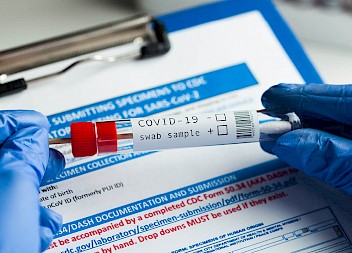In order for a clinical negligence claim for compensation to be successful, the claimant has the burden of proof to show that they suffered an injury or their condition worsened because of negligent medical treatment.
But it is not just as simple as having your word that something went wrong with your care. Neither is it enough for the defendant to admit they made a mistake.
Three elements must be proven by a claimant’s clinical negligence solicitor:
- The defendant owed you a duty of care
- This duty of care was breached
- The breach of duty of care resulted in physical or psychological harm/injury
The first point is usually straight-forward enough to prove as most clinical negligence claims are made against healthcare professionals who owe all patients a duty of care. If a role assumes responsibility over a patient’s care, whether that’s a consultant, GP, nurse, or healthcare assistant, then they will have a duty of care.
When is duty of care breached?
When investigating a clinical negligence claim, your solicitor will first need to prove that the medical professional(s) involved breached their duty of care. Without this, a clinical negligence claim cannot proceed.
All healthcare professionals have a legal obligation to adhere to standards of reasonable care while performing acts that could harm others. But it is the word ‘reasonable’ that comes as a surprise to most clinical negligence claimants, and where claims for clinical negligence can become highly contentious and difficult to determine.
The reasonable standard is judged against an ordinarily competent practitioner performing the same task or role. It is not affected by personal attributes such as level of experience. Therefore, a newly qualified doctor, for example, would be expected to perform at the same reasonable standard as someone who has worked in the same role for decades.
Duty of care could include taking reasonable care to:
- Take a proper medical history
- Investigate symptoms or complaints properly
- Make a differential diagnosis and document it
- Make any necessary referrals to specialists
- Provide necessary treatment
- Follow up with a patient if necessary
Overall, a medical professional has a duty of care to ensure all steps are taken to protect a patient’s health.
How do you determine breach of duty?
There are two tests which have become the twin pillars of all assessments of clinical negligence: the Bolam and Bolitho tests.
What is the Bolam Test for clinical negligence?
This is the benchmark for determining failure in duty of care and relates to a High Court case from 1957. Bolam was a psychiatric patient with depression who voluntarily underwent electroconvulsive therapy (ECT) at the defendant hospital.
The defendant failed to provide muscle relaxant drugs or restrain the patient during the procedure, which led to him suffering violent spasms, falling off the bed and fracturing his pelvis.
During his claim, he claimed that, had he been warned of the risks of ECT, he wouldn’t have agreed to the treatment. Also, had he received the muscle relaxant drugs and been properly restrained, his injuries wouldn’t have happened.
The defendant maintained they had no requirement to explain the risks unless asked by the patient. Expert witnesses confirmed that most medics of the same standard were opposed to using relaxant drugs, and also that manual restraints could increase the risk of fracture so were not commonly used.
This led to the legal system developing and implementing the Bolam Test as a way to measure clinical negligence – no medical professional can be found to be negligent if they acted in accordance with proper and accepted practice of their peers at the time.
What is the Bolitho Test for clinical negligence?
The rules surrounding the Bolam Test were amended following the 1998 Bolitho case, based upon the importance of logic in decision making.
The Bolitho case involved a toddler who was taken to hospital with croup and breathing abnormalities. A doctor was summoned but no senior paediatric registrar came to see the child due to being busy or not receiving the message due to a flat pager. The child’s condition deteriorated, and he went into cardiac arrest, suffered brain damage and sadly died.
The child’s parents sued for negligence, arguing that the child should have been seen and intubated.
Despite both parties agreeing that only intubation would have avoided the tragedy, in their defence, the senior paediatric registrar argued that they would not have intubated the patient even if they had attended.
So, in order to meet the Bolam test, the next question was would other competent doctors have done the same? The trial heard from eight expert witnesses, three of whom agreed they wouldn’t have intubated in that situation. Because of this, the defendant was not found to have breached her duty of care.
During the various appeals that followed, the claimant argued that it was ‘unreasonable and illogical not to anticipate the recurrence of a life-threatening event’ and that they should have taken steps to save the deceased from harm, even if the cause of the breathing abnormalities were unknown.
It is not enough for the courts to be bound by expert opinion or evidence, in this case which agreed with the defendant; the court has to decide whether logic was demonstrated.
Scope of Duty of Care
In cases that cover informed consent or improper advice given by medical professionals, another mitigating factor that has been seen in a few recent cases is the scope of duty of care.
With scope of duty of care, context is key. The risk from which a patient is wanting to protect themselves, must be considered and the purpose of advice judged objectively. Even if the advice given is very narrow, there is still a duty of care to extend that response beyond the matter asked. It sets a precedent that can exclude damages for incidental, unrelated errors that occur from negligent advice.
More commonly found in professional law cases relating to negligent business advice, scope of duty of care was recently invoked in a wrongful birth case, Khan v Meadows (2021). Meadows, the claimant, sought advice from her GP about whether she carried the haemophilia gene, a rare condition affecting the body’s ability to clot. The information given would impact whether she had children or not.
Her GP arranged a blood test but failed to advise that she’d actually need a genetic test to establish whether she was indeed a carrier: the blood test only tested to see if she had haemophilia herself, which she did not.
This resulted in her being incorrectly led to believe she was not a carrier of the haemophilia gene and she went on to plan a pregnancy.
She gave birth to a son who had haemophilia and argued that, had she been advised she was a carrier, then she would have undergone foetal testing and terminated the pregnancy. She submitted a claim for the cost of caring for the child.
However, the child also had autism, which was unrelated to the alleged negligent act of improper advice, but the claimant included this in the valuation of her claim - £9 million.
The defendant accepted breach of duty on the ‘but for’ principle; had reasonable advice been given, the pregnancy would have been terminated. However, Dr Khan argued that whilst autism was reasonably foreseeable, she was not responsible for those losses as this was outside her scope of duty of care.
Here, context was applied. The claimant had only sought advice for haemophilia, so therefore damages could only be limited to the consequence of that.
One major question was asked: what would the claimant’s loss have been if the information given had indeed been correct – that she wasn’t a carrier of haemophilia? Her child would still have had autism.
The legal framework applied here was SAAMCo, relating to South Australia Asset Management Corporation v York Montague Ltd (1997) regarding the overvaluation of a property. Under SAAMCo, a claimant is not entitled to claim more in damages than the amount they’d have lost had the valuation not been negligent.
In Khan v Meadows, the same principle was applied, reducing Meadows’ previous compensation of £9m to £1.4m for ongoing care costs without the addition of the autism diagnosis.
A six-point test is used to establish scope of duty of care:
- The actionability question - Is the harm (loss, injury and damage) which is the subject matter of the claim actionable in negligence?
- The scope of duty question - What are the risks of harm to the claimant against which the law imposes on the defendant a duty to take care?
- The breach question - Did the defendant breach his or her duty by his or her act or omission?
- The factual causation question - Is the loss for which the claimant seeks damages the consequence of the defendant's act or omission?
- The duty nexus question - Is there a sufficient nexus between a particular element of the harm for which the claimant seeks damages and the subject matter of the defendant's duty of care as analysed at stage 2 above?
- The legal responsibility question - Is a particular element of the harm for which the claimant seeks damages irrecoverable because it is too remote, or because there is a different effective cause in relation to it, or because the claimant has mitigated his or her loss or has failed to avoid loss which he or she could reasonably have been expected to avoid?
How can Medical Solicitors help?
This is a complex area of law and it is best to seek specialist advice from a medical lawyer on these questions.
Our friendly team of specialist lawyers at Medical Solicitors have a lot of experience in bringing successful medical negligence claims. Our intial screening process provides a thorough, in-depth assessment of an enquiry free of charge to see if what happened to a patient was a substandard care that amounts to actual medical negligence.
If we decide there is a good chance of success, we conduct most of our Clinical and Medical Negligence claims under ‘No Win, No Fee’ agreements, also known as Conditional Fee Agreements. So, you do not have to worry about how you are going to afford to bring a medical negligence claim for compensation. You have nothing to lose in speaking to us.





